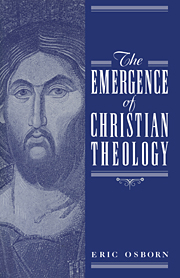Book contents
- Frontmatter
- Contents
- Preface
- List of references
- List of abbreviations
- 1 One God: questions and opposition
- 2 The One and the Mind
- 3 The Bible as the material of theology
- 4 One God as cause and father
- 5 The unity of all things in Christ
- 6 One God in a new way: by the son and spirit
- 7 One good
- 8 One mind, truth and logic
- Conclusion
- Appendices
- Bibliography
- Index of modern writers
- Index of subjects
4 - One God as cause and father
Published online by Cambridge University Press: 23 November 2009
- Frontmatter
- Contents
- Preface
- List of references
- List of abbreviations
- 1 One God: questions and opposition
- 2 The One and the Mind
- 3 The Bible as the material of theology
- 4 One God as cause and father
- 5 The unity of all things in Christ
- 6 One God in a new way: by the son and spirit
- 7 One good
- 8 One mind, truth and logic
- Conclusion
- Appendices
- Bibliography
- Index of modern writers
- Index of subjects
Summary
With the resources of the Bible and philosophy, how do the first theologians respond to the fourfold challenge of state, heretics, philosophers and Jews? They reject the many, fallible gods of the state, and the separation of old and new testaments by Jews and heretics; they claim the transcendence of the philosophers' first cause and the truth of divine creation. God is one, father, cause, creator, spirit, lord of history and entirely good. They begin from the unity of God. We have already considered part of Clement's response in an earlier chapter.
MYSTERY AND THE MONAD
God is one, says Clement, and beyond the monad (paed. 1.8.71). He is outside language and cannot be described in writing. The use of riddles is recommended so that anything written about God will do less harm should it fall into the wrong hands. Indeed, it is better not to write, but to learn (str. 5.10.65). God is beyond the reach of logic or the practice of speech; yet the riddles, which express him, act as a safeguard and deepen his mystery.
Mystery
Plato and other Greeks believed that truth was linked with mystery. The philosopher followed the path of the initiate (Phdr. 249a–250c).
- Type
- Chapter
- Information
- The Emergence of Christian Theology , pp. 109 - 141Publisher: Cambridge University PressPrint publication year: 1993

